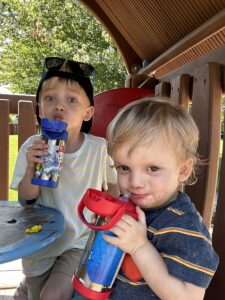How I’m learning to cope with challenges as a rare disease parent
This year, I'm focusing on finding balance and giving myself grace
Written by |

Heading into the new year, one thing I’ve chosen to focus on is how I cope with challenges and obstacles in life. The last few months have been crazy as I navigated a busy season at work, the holidays, coaching my older son’s basketball team, and balancing family life with two boys. To say that it’s been tough to find time to reset would be an understatement. And having a strong-willed and, at times, stubborn 3-year-old is a big part of that.
My youngest son, Finley, will turn 4 later this month. Finley was born with Alagille syndrome and diagnosed at 4 months old. Adding a second child to the mix already massively changes a parent’s routines. It takes time to adjust and find a “new normal.” But coupled with a medically complex birth and a rare genetic disease diagnosis, it was a lot to navigate. Oh, and all of that took place in 2021 during the pandemic. What a combo of challenges!
But while those early days and years of Finley’s life were challenging, I’m having a harder time navigating the present day. Between work, a commute, day care pickup and drop-off, cleaning the house, taking care of myself, and trying to be a good dad, husband, and youth coach, there is so much to balance. But like every other parent, I find ways to make it work.
Facing challenges as an Alagille syndrome parent
Finley is currently in what we’ll call a learning phase. He’s learning how to push boundaries and exploring what he can and cannot control. This is normal for a child his age. But for me as his parent, Alagille syndrome is a constant looming presence.
When Finley is being difficult at bedtime, I have to step back and ask, “Is this because he’s unable to sleep due to his itching?” When he isn’t eating dinner, a totally normal thing at his age, I cannot help but stress, knowing he needs those calories more than his peers to help him grow.
It all adds up, and at times I haven’t been the parent I want to be when navigating behavioral challenges.
Finley is a very sweet kid who’s kind, smart, and adventurous. He’s also capable of screaming louder than most adults. I have no doubt his strong-willed nature will serve him well later in life. But right now? It’s difficult when you’re just trying to get him in his car seat to go to day care in the morning.
I’m learning to have grace for issues that may be impacted by his Alagille syndrome and find ways to support Finley instead of getting frustrated. I don’t need to get worked up about him not eating enough at one meal, because even though he needs the nutrition, one meal won’t upset his growth.
It’s hard to let go of the stress of raising a child with a rare disease, but I’m working to find a balance.
I’m also working to find support for myself and am trying new methods of coping with the stress and anxiety. I still need to work through a lot of the trauma we experienced before Finley’s diagnosis was confirmed, so I’m talking with a therapist, reading articles, and taking time for myself.
My message to parents raising kids — especially those with a rare disease — is to give yourself grace. Raising kids is hard, and balancing all aspects of life is challenging. Make sure you take time to navigate your own obstacles. Put your kids first, but don’t leave yourself behind when it comes to self-care and support. Your kids are important, but so are you.
Note: Liver Disease News is strictly a news and information website about the disease. It does not provide medical advice, diagnosis, or treatment. This content is not intended to be a substitute for professional medical advice, diagnosis, or treatment. Always seek the advice of your physician or other qualified health provider with any questions you may have regarding a medical condition. Never disregard professional medical advice or delay in seeking it because of something you have read on this website. The opinions expressed in this column are not those of Liver Disease News or its parent company, Bionews, and are intended to spark discussion about issues pertaining to liver disease.




Leave a comment
Fill in the required fields to post. Your email address will not be published.